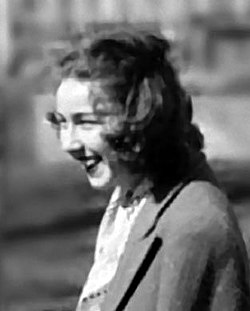Flannery O'Connor Quote
Silly that a grocery should depress one—nothing in it but trifling domestic doings—women buying beans—riding children in those grocery go-carts—higgling about an eighth of a pound more or less of squash—what did they get out of it? Miss Willerton wondered. Where was there any chance for self-expression, for creation, for art? All around her it was the same—sidewalks full of people scurrying about with their hands full of little packages and their minds full of little packages—that woman there with the child on the leash, pulling him, jerking him, dragging him away from a window with a jack-o’-lantern in it; she would probably be pulling and jerking him the rest of her life. And there was another, dropping a shopping bag all over the street, and another wiping a child’s nose, and up the street an old woman was coming with three grandchildren jumping all over her, and behind them was a couple walking too close for refinement.
Silly that a grocery should depress one—nothing in it but trifling domestic doings—women buying beans—riding children in those grocery go-carts—higgling about an eighth of a pound more or less of squash—what did they get out of it? Miss Willerton wondered. Where was there any chance for self-expression, for creation, for art? All around her it was the same—sidewalks full of people scurrying about with their hands full of little packages and their minds full of little packages—that woman there with the child on the leash, pulling him, jerking him, dragging him away from a window with a jack-o’-lantern in it; she would probably be pulling and jerking him the rest of her life. And there was another, dropping a shopping bag all over the street, and another wiping a child’s nose, and up the street an old woman was coming with three grandchildren jumping all over her, and behind them was a couple walking too close for refinement.
Related Quotes
About Flannery O'Connor
O'Connor was a Southern writer who often wrote in a sardonic Southern Gothic style. She relied heavily on regional settings and grotesque characters, often in violent situations. In her writing, an unsentimental acceptance or rejection of the limitations, imperfections or differences of these characters (whether attributed to disability, race, crime, religion or sanity) typically underpins the drama.
O'Connor's writing often reflects her Catholic faith, and frequently examines questions of morality and ethics. Her posthumously compiled Complete Stories won the 1972 U.S. National Book Award for Fiction and has been the subject of enduring praise.
